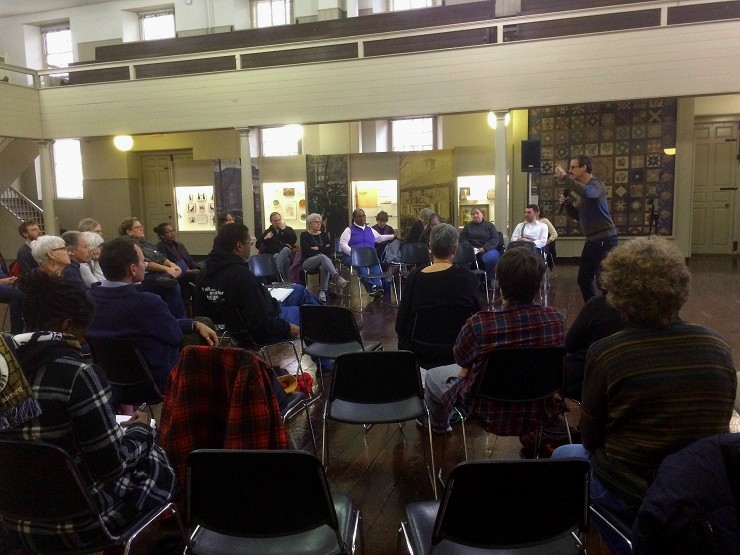
photo by Gage Beemish Gage Beemish
“My faith is tested frequently, because I want to believe in people.”
- A participant in the workshop
Chris Crass is a longtime organizer, educator, and writer working to build powerful working class-based, feminist, multiracial movements for collective liberation. He is one of the leading voices in the country calling for and supporting white people to work for racial justice. He joined with white anti-racist leaders around the country to help launch the national anti-racist network Showing Up for Racial Justice (SURJ), which works in white communities for racial justice. Rooted in his Unitarian Universalist faith he works with congregations, seminaries, and religious and spiritual leaders to build up the Religious Left. He lives in Louisville, KY with his partner, and their two kids. Learn more about Chris here. On November 18, 2017, Chris led a four hour workshop on racial justice. Below are the reflections that followed by Christina Elcock.
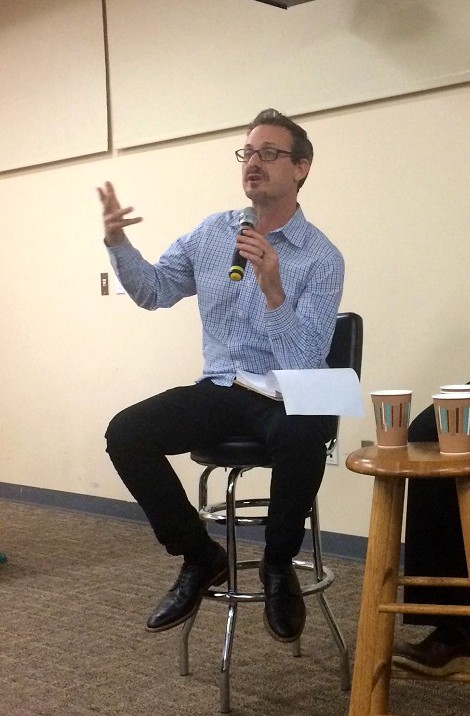
At 12 o’clock, I entered Arch Street Meeting House to participate in a racial justice workshop designed and run by Chris Crass. Known for his charismatic and zestful talks, I came to see Chris offer his wisdom in energy, mind, and spirit.
The seats were filled with people from a variety of faith backgrounds: Quakers, Unitarian Universalists, a Presbyterian, a Catholic, and those who identified within two faith traditions such as Judaism and Quakerism. We sat in the East Room in a semi-circle as an interfaith congregation brought together by, at the very least, one commonality – our burning desire to end racial injustice.
Chris opened by talking about the deep-seated competitive nature that resides in The United States. It’s interesting that even in our religious congregations we are not free from social conditioning. Chris offered an example of this. He talked about members of congregations challenging each other over who is doing the most anti-racism work and who can be the “best white person” in the room. “This hierarchical thinking is white supremacy,” Chris states, “and letting go of such thinking is part of an ongoing process of getting free.”
Despite Chris’s anti-competitive message, he still describes social justice work as a marathon, but one that we are all running together with the same unanimous end-goal. Sometimes we sprint and there is progression, and sometimes we burn out and need to rest, but while one or two of us rests, someone else will pick up the pace and run. The idea that we are all in it together is what gives this movement towards justice stability and strength.
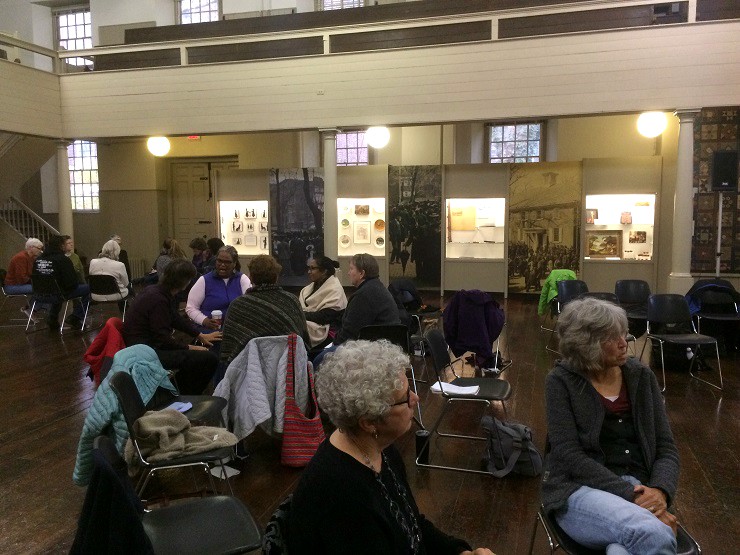
In the workshop, we introduced ourselves and said why we were there. There were a plethora of answers such as: to stop hating white people, to stop being triggered by “dumb” white racist things, to get free, to be tougher and more resilient in meetings. An African-American woman continued by saying that it was hard to be in a space where she always had to be in self-protective mode, particularly against what Chris named as “well-intentioned aggression.” Chris said it is when a European-American, when interacting with a marginalized person, is aggressively nice, indirectly asking for validation of the marginalized person so that they can be redeemed and accepted as “one of the good ones.” This sociological analysis further exemplifies the very clear racial divide in American society presented even by those who are consciously going out of their way to break down racial barriers and rehumanize themselves and people on the margins. Their desire to appear to “be good” gets in the way of acting to upend white supremacy. In this dynamic they are, whether intentionally or not, reinforcing the power they possess to dehumanize someone in the first place.
I pondered over this message and felt exasperated that the social construct of race is still so excessively prominent. Even as time passes, the storm of prejudice and power still weathers over modern society unable, yet, to eradicate the ever-thriving racial hierarchy. People are still enslaved though perhaps in new ways, the lives of people of color are still extremely targeted, poverty rates are still high. The racism is blatant: it shows up in the lack of education, the lack of integration, the economic discrepancies, the greed and in the deep-rooted fear of the “other.”
Chris Crass spoke of the ongoing journey it takes to get free, but I am impatient:
Hurry up, justice,
hurry up, peace.
Chris encouraged us to stand in alphabetical order according to the name of the person who inspired us. In small groups of threes, we were asked to share who our person was and why. I named my mother because she leads by example almost always with love. Her kindness and her gentle spirit has helped shaped me into the person I am today and into the person I am constantly striving to be.
One member of my group asked me more specifically how my mother inspired me in the framework of racial justice, and my mind went blank. I had to rephrase the question in my mind because race isn’t necessarily at the forefront of discussion in the U.K. (where I am from). Culture, nationality, class, and ethnicity are. With this in mind, I was able to voice that my inspiration came from the stories my mother would tell me of Grenada and her childhood there, it came from being able to visit and spend time with my West Indian family and from being able to find home there myself. It came from listening and dancing to soca and calypso music, it came from going to the spice and food markets and being able to cook and feast on traditional dishes. My mother was able to bring vibrancy to my cultural identity simply by making me aware of it.
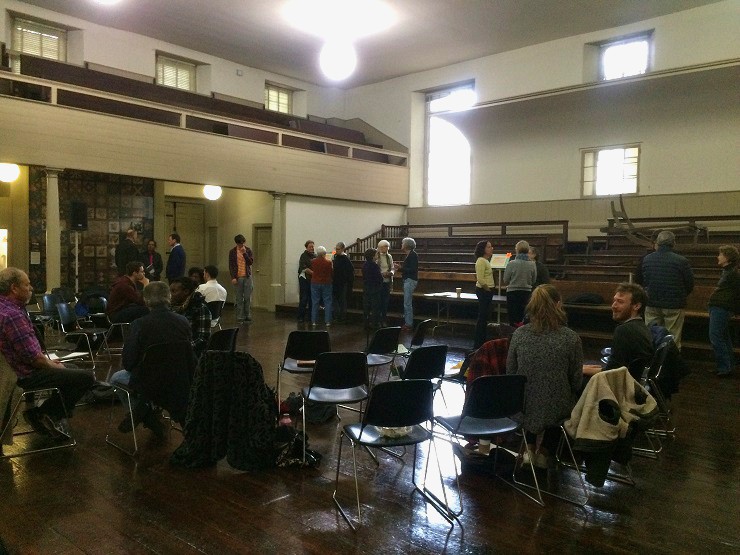
As people work for racial justice in the United States, there is a huge backlash against it. As white people work to become anti-racist, feelings of self-hatred arise in white people and thus against other white people. Chris warns that if we are to make progress, it is ineffective to organize white people if you hate them because you cannot successfully organize people you hate. We may hate white supremacy and what it does both to people of color and white people, but if we are committed to change, we must be willing to forge bonds with other white folks, helping others see how participating in white supremacy robs white people’s humanity, too, as well as devastating communities of color.
The main message I took away from the workshop, “We need to bring the love we have for ourselves into this space and the love we have for others when dealing with the chaos and disruption in our congregations and in the world.” Chris also reminds us that wishing for more marginalized voices at meetings to guide and to help do this work is important, but not necessary. The absence of people of color shouldn’t prevent us from working to undo racism because there are steps we can still take in the right direction. Chris stated that if you are from a predominantly white state or town, there is ample opportunity to do anti-racist work. White people can open up difficult conversations with family and friends, lobby for the rights of people of color in schooling, housing, policing, etc. and take the time to learn a history that isn't white-washed.
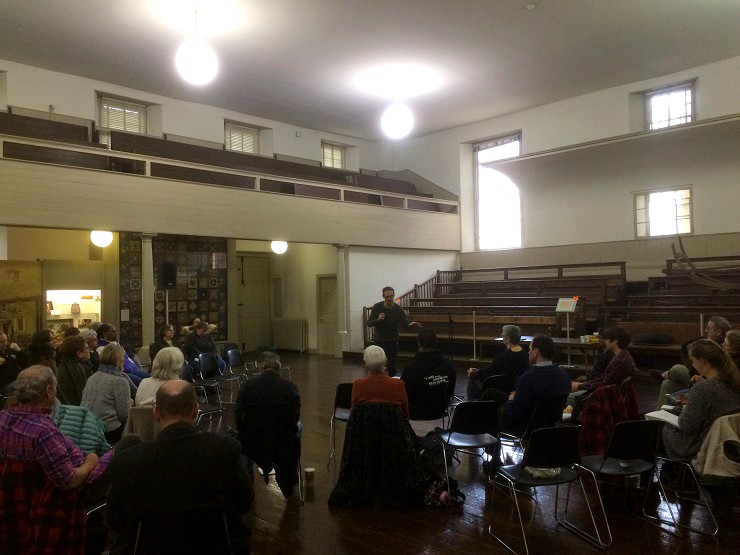
Another activity Chris asked us to participate in was asking us to reflect on a time where we put ourselves and our bodies in the way of social justice that awoke within us a commitment to racial justice. To this, an African-American woman in the workshop asked what racial justice meant and instead of giving her a generic, dictionary answer, Chris asked us each to close our eyes and for silence, so we could really connect to spirit and reflect upon this question and this term that we hear so often. He called forth the power in each of us, to envision the different ways we see racial justice. When the silence was over, Chris asked us to share what we had seen in the silence, and one by one we shared ways to achieve racial justice: adequate education funding, profound economic distribution, learning true history at school, holding the innate belief that all children are our children.
These ideas for racial justice were built inside of us before they could be built outside of us. It is apparent that to begin to undo the systems in the world, we needed to first undo the systems within ourselves.
Related posts
5 things I learned from talking with Chris Crass